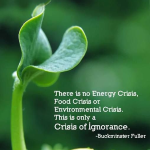
Electrical Sector GHG Reduction and the IMBECS Protocol by Marine BECCS
 Jeff Harti Jun 24, 2014 07:25 |
@michael123, thanks for the proposal. I you could please paste the actual information instead of just the links to your other proposal, that would be appreciated. Otherwise, we will not be able to review it.
|
 Michael Hayes Jun 28, 2014 04:47 | Proposal contributor
Thanks jhart, I'll try to have the proposal reworked specifically for this competition soon. I've been working at the global carbon management scale, conceptually wise, and I'll need a little time to convert the work over to this particular sector.
Best,
|
 Sergio Pena Jul 1, 2014 05:00 |
Excellent project and idea.
A contribution.
One question, is it possible to work out the project in a developing country without financial means to pay for the project? We should think globally and act locally.
Sergio Peña
|
 Michael Hayes Jul 1, 2014 06:53 | Proposal contributor
Prof. Pena,
Thank you for your kind compliment. Yes, the IMBECS Protocol would support the poorer nations in getting started. Once started, they would be equals to the largest nations. The profits from the initial production capacity would support further expansion of production. I believe this sets up such an attractive option that intergovernmental governance is needed to keep peace and order on the oceans while protecting the planetary environmental needs. Even the IMBECS can be, eventually, over used and or abused.
It is my strong belief that the poorer nations, with the up coming $100B yearly mitigation payments, can be the prime initiators of the IMBECS Protocol and oceanic operations.
Thank for bring this subject up as I've been meaning to cover it in the draft and have failed to do so. It is an import subject which needs more than just a passing comment.
If you would like to contribute your thoughts on the management of the $100B mitigation budget, I would be deeply grateful.
Best regards,
|
 Nanda Kumar Janardhanan Jul 19, 2014 09:40 |
Mic, Thanks. Interesting proposal. Is there a specific reference section for this proposal?
|
 Michael Hayes Jul 19, 2014 04:41 | Proposal contributor
Nanda,
I've placed a link to my 'Author's notes' file within the proposal(s). The scope of relative material is virtually limitless (as I'm sure you know) and thus I will be adding links to knowledge bases for some time to come.
In simple terms, I am confident that the major claims, within the IMBECS Draft and the different Climate CoLab proposals, are supportable at a high level. I've gone out of my way to not inject my own 'inventions' or even opinions. Yet, it is impossible to do this type of work without putting ones self into it. As such, questions from knowledgeable people, like yourself, is important to an independent actor such as myself.
If you have any specific questions, please let me know.
Best regards,
Michael
|
 Michael Hayes Aug 9, 2014 03:32 | Proposal contributor
In an effort to answer the questions raised in the other contests, which the overall IMBECS Protocol proposal has reached the semi-final level, I've created a Google Doc to help avoid character limitations and provide working links to key references. Many questions being asked about the IMBECS Protocol requires more than simplistic answers. The Google Doc., titled simply 'Response to the MIT Climate CoLab Questions', can be found at the below address.
https://docs.google.com/document/d/1acQkkyOKrbovpYr2lcArbCSNKl1rFDA0GgSG_MJayXU/pub
The above document will be up-dated until completion of all related contests.
|
 Climate Colab Aug 13, 2014 04:20 |
In a future version of this proposal, we would like to see analysis regarding cost effectiveness of a pilot plant. For a future proposal, you and your team could focus on building up a hypothetical project and extrapolate and scale it to show a wider scale effect.
|
 Mark Johnson Aug 14, 2014 09:15 |
It's a no-brainer to use carbon-negative biofuels in the power plants - doesn't this idea boil down to supply satisfying demand?
|
 Michael Hayes Aug 15, 2014 02:40 | Proposal contributor
Mark,
Yes, the entire issue does come down to developing the scale of vary basic biomass cultivation. We are on the technical cusp of being able to realize the needed scale/efficiency needed to bring bio-fuels to the market at a level which could compete with FFs..
In Brazil, the largest bio-refinery ever developed will go on line in the near future. You may wish to look at: Novamont is building the largest biorefinery in the world - a €540 million investment in Porto Torres.
Here is their website.
http://www.novamont.com/default.asp?id=414
Novamont is focusing upon terrestrial cultivation for their biomass which has a number of limiting factors..if...one is looking at global scale needs. The primary focus of this group of investors is profit orientated, and as such, they will probably do well. However, at the global scale solution to energy paradigm change/climate change mitigation, the limiting factors within terrestrial biomass/biofuel comes up short on multiple levels.
The limiting factors of terrestrial BECCS are well established at the IPCC WG3 level. One the other hand, the use of the marine environment (MBECS) for biomass production simply makes the majority of terrestrial BECCS limitations moot.
Thank you for your input.
Michael
|
 Mark Johnson Aug 16, 2014 03:22 |
Thank you Michael. Novamont has impressive Euro efforts. Blends and leverages local participation into national-global possibilities, albeit with limitations.
I like the company's marketing - bringing chemistry, agriculture and the environment together:
“Living Chemistry for Quality of Life”: to develop materials and biochemicals through the integration of chemistry and agriculture, by starting up third-generation biorefineries in the local areas and providing application solutions that ensure efficient use of resources throughout their entire life cycle, with advantages for the social, economic and environmental system."
It's a Biomass Center of Excellence. Just last month, the British government adopted Novamont's organic cycle for food waste. It's also able to produce bioplastics, and they seem to offer a blueprint for "lifecycle supply chain management." So many possibilities. MBECS sourcing is the way to go. Good Luck, Well Done and Good Wishes. Mark
|